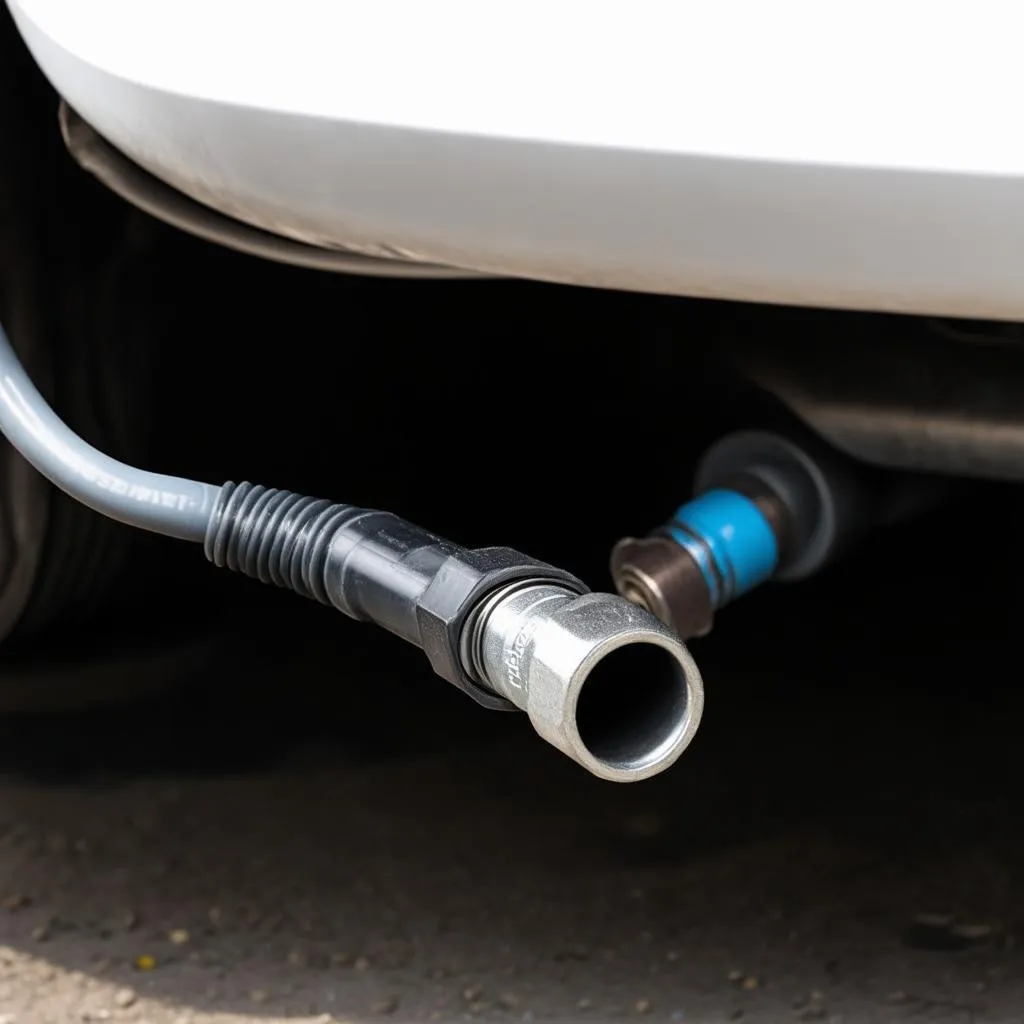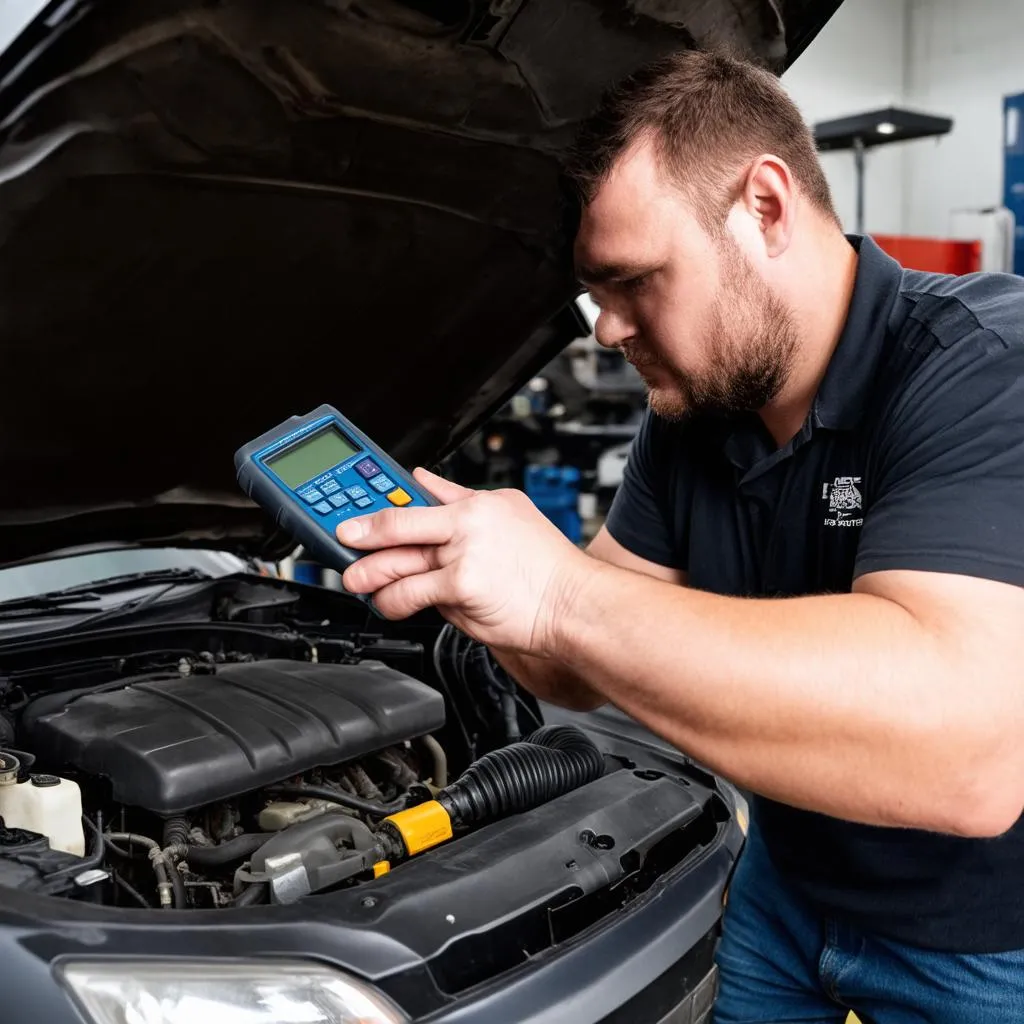Imagine this: you’re cruising down the highway, enjoying the open road, when suddenly, your check engine light throws a tantrum. You nervously pull over, wondering what could be wrong. A quick check with your OBD-II scanner reveals the cryptic message: “P0130.” Don’t panic! That jumble of letters and numbers is just your car’s way of saying something’s up with its oxygen sensor.
“But wait,” you might ask, “what even is an oxygen sensor, and why should I care?” Well, my friend, that little sensor plays a big role in keeping your car running smoothly and efficiently. It’s time to delve into the world of OBD code P0130, understand what it means, and learn how to get your car back on track.
P0130: What Does It Mean and Why Should You Care?
In a nutshell, the P0130 code indicates a problem with the oxygen sensor in Bank 1, Sensor 1. This sensor, usually located before the catalytic converter, is responsible for measuring the amount of oxygen in your car’s exhaust stream. This information is crucial for your car’s engine control unit (ECU) to maintain the optimal air-fuel mixture for combustion.
Why should you care about a little sensor?
Well, a malfunctioning oxygen sensor can lead to:
- Decreased fuel economy: An incorrect air-fuel mixture can make your engine burn more fuel than necessary.
- Increased emissions: A rich fuel mixture can lead to higher emissions, negatively impacting the environment.
- Poor engine performance: Your car might experience rough idling, hesitation, or even stalling due to an imbalanced air-fuel ratio.
- Damage to the catalytic converter: A faulty oxygen sensor can cause the catalytic converter to overheat and potentially fail, leading to a hefty repair bill.
“But what does Bank 1, Sensor 1 even mean?” I hear you ask. Great question!
- Bank 1 refers to the side of the engine where cylinder number one is located.
- Sensor 1 indicates the oxygen sensor positioned before the catalytic converter.
So, in essence, P0130 means your car’s primary oxygen sensor on the side of the engine with cylinder one is having some issues.
Unraveling the Mystery: Common Causes of P0130
Just like a detective searching for clues, let’s investigate some common culprits behind the P0130 code:
- Faulty Oxygen Sensor: The most common reason for this code is a worn-out oxygen sensor that needs replacing. Oxygen sensors have a limited lifespan and degrade over time.
- Exhaust Leaks: Any leaks in your exhaust system before the oxygen sensor can allow unmetered air to enter, throwing off the sensor’s readings.
- Vacuum Leaks: Similar to exhaust leaks, vacuum leaks can also disrupt the air-fuel ratio and trigger the code.
- Wiring Issues: Damaged or corroded wiring and connectors in the oxygen sensor circuit can disrupt the signal transmission.
- Fuel System Problems: Issues like a clogged fuel filter, malfunctioning fuel injectors, or a faulty fuel pressure regulator can also contribute to an incorrect air-fuel mixture.
Navigating the Fix: What to Do About P0130
Now that we’ve identified the potential suspects, let’s explore how to resolve the P0130 code and restore your car’s performance:
- Diagnose the Problem: While a P0130 code typically points to the oxygen sensor, it’s crucial to diagnose the problem thoroughly before replacing any parts.
- Inspect for Leaks: Carefully check your exhaust system and vacuum lines for any leaks.
- Check the Wiring: Inspect the oxygen sensor wiring harness for damage, loose connections, or corrosion.
- Test the Oxygen Sensor: If the previous steps don’t reveal the issue, you can test the oxygen sensor’s voltage output using a multimeter.
- Replace the Oxygen Sensor: If the oxygen sensor is confirmed to be faulty, it’s best to replace it with a new one.
Remember: While DIY repairs can be tempting, consulting a qualified mechanic is always recommended, especially for complex issues like oxygen sensor replacement.
 Oxygen Sensor Close-up
Oxygen Sensor Close-up
Frequently Asked Questions about OBD Code P0130
Here are some common questions car owners have about the P0130 code:
- Can I still drive with a P0130 code? While you might be able to drive for a short distance, it’s not recommended. Ignoring the code can lead to further damage and costly repairs.
- How much does it cost to fix a P0130 code? The cost can vary depending on the underlying cause and your car’s make and model.
- How long does it take to replace an oxygen sensor? Replacing an oxygen sensor is usually a straightforward procedure for a mechanic and can be done within an hour or two.
Beyond P0130: Exploring Related OBD Codes
The P0130 code is just one piece of the puzzle. Here are some other related OBD-II codes you might encounter:
- P0131: Oxygen Sensor Circuit Low Voltage (Bank 1, Sensor 1)
- P0132: Oxygen Sensor Circuit High Voltage (Bank 1, Sensor 1)
- P0133: Oxygen Sensor Circuit Slow Response (Bank 1, Sensor 1)
- P0134: Oxygen Sensor Circuit No Activity Detected (Bank 1, Sensor 1)
Your Car’s Oxygen Sensor: A Holistic Perspective
Interestingly, the oxygen sensor’s role in maintaining balance within your car’s engine mirrors the importance of balance in our own lives. Just as an imbalanced air-fuel mixture can wreak havoc on your engine, imbalances in our lives – be it work, relationships, or personal well-being – can lead to stress and disharmony.
In many spiritual traditions, finding balance is seen as essential for achieving inner peace and harmony. Perhaps your car’s P0130 code is a gentle reminder from the universe to pay attention to areas in your life that might need rebalancing.
Don’t Let P0130 Rain on Your Parade!
Remember, knowledge is power! By understanding what the P0130 code means and how to address it, you can confidently tackle this common car issue.
 Mechanic Diagnosing a Car Problem
Mechanic Diagnosing a Car Problem
Need Help Deciphering Your Car’s Codes?
Do you have more questions about the P0130 code or other car diagnostic tools? Don’t hesitate to reach out! Our team of automotive experts is here to help you navigate the world of car repairs and keep your vehicle running smoothly.
Contact us on Whatsapp at +84767531508 for expert advice and support with all your car diagnostic needs.
We’re here to help you get back on the road and enjoy the journey!